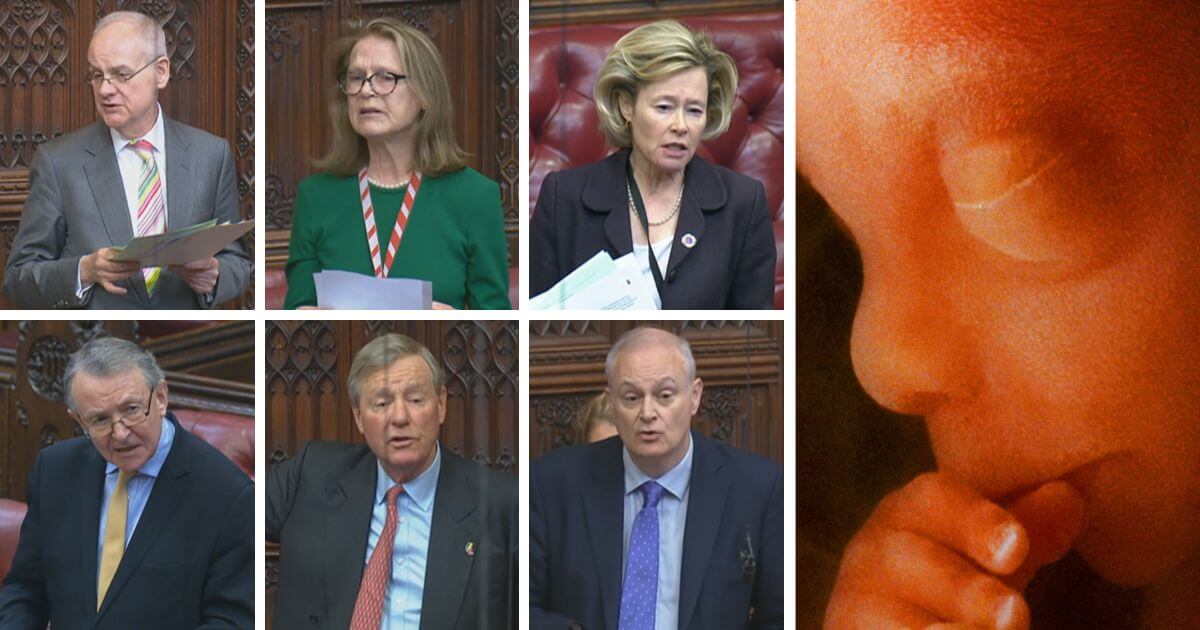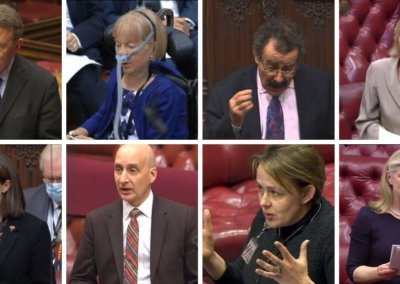Lord Moylan’s Foetal Sentience Committee Bill, which intends to create a committee to act as a source of evidence-based scientific expertise on the sentience of unborn babies in accord with developments in medical knowledge, received its Second Reading in the House of Lords this afternoon.
The Bill passed Second Reading without there being a division, as is the convention in the Lords, and will now proceed onto Committee Stage.
The committee that would be created by the Bill would advise the Government on the formulation of relevant policy and legislation related to foetal sentience.
According to Lord Moylan, the committee would not only be relevant for abortion legislation, but also have implications for foetal medicine and, in particular, corrective foetal surgery.
Peers speak in support
The Bill was supported by a number of Peers who pointed to the disagreements between various medical bodies as well as their changing stances on the question of foetal sentience over time as reasons for their support of the Bill.
In his speech, Lord Moylan pointed to the inconsistency in current medical practice and highlighted the changing understanding of foetal sentience.
The British Association of Perinatal Medicine (BPAM), in written evidence to Parliamentarians, acknowledged that “foetuses born as early as 22 weeks gestation do show physical and physiological responses to pain, and there is no reason to think that foetuses at this gestation are any different”.
However, 2022 guidance issued by the Royal College of Obstetricians & Gynaecologists (RCOG), stated “there is no basis for considering the administration of analgesia or anaesthesia to a foetus before termination of pregnancy in the first or second trimester to prevent fetal perception of pain”.
At the same time, as Lord Moylan pointed out, “the NHS recommends the use of analgesia for the foetus in the case of operations in utero for spina bifida from 20 weeks onwards. So it is fair to say that there is considerable breadth of view on the question of human foetal sentience”.
Lord Moylan also alerted the Lords to the fact that the RCOG had changed its own position on the matter from its 2010 position.
Baroness Smith of Newnham agreed on this point and drew particular attention to the difference between the RCOG guidance on foetal sentience and statements from the British Medical Association (BMA). Quoting from the BMA, the Baroness said “even if there is no incontrovertible evidence that the fetus feels pain, the use of fetal analgesia when carrying out any procedure (whether an abortion or a therapeutic intervention) on the fetus in utero may go some way in relieving the anxiety of the woman and health professionals”.
She continued: “Surely, if a foetus of 24, 25 or 26 weeks’ gestation is sentient—whether the proposal is for a medical intervention or for the purposes of abortion—no one would want that foetus to suffer, including the woman carrying the foetus, whether they intend to carry it to term or they do not wish it to live. Surely nobody wants to inflict pain. If we understand at what point foetal sentience really comes into play, appropriate decisions and recommendations can be made”.
Similarly, Lord Jackson of Peterborough, who also spoke in favour of the Bill, drew attention to a peer-reviewed study of twins at 14 weeks’ gestation. He said: “the study found that the twins’ self-directed hand movements were more calibrated than movements to the uterine wall, while movements towards the co-twin exhibited even greater care. The study determined that such deliberate actions could not be the result simply of spontaneous reflexes. The team behind the study concluded that these findings force us to predate the emergence of social behaviour”.
Current law gives more legal protection to mammal, bird and reptile foetuses than human unborn babies
Other peers noted the inconsistency between the protections provided to animals and the lack of similar protections for a human foetus.
Both Lord Moylan and Lord Alton of Liverpool highlighted the inconsistency between the manner in which animal and human sentience are treated under the law. Lord Moylan said the Animal Welfare (Sentience) Act 2022, established a precedent for his own Bill by requiring the Government to set up a committee “precisely to give it advice on policy in relation to animal sentience”.
Lord Moylan explained this legislation declares mammals and certain shellfish to be sentient and said “I would be surprised if my noble friend the Minister [Lord Markham] wanted to say that a human foetus should be denied the same esteem as a lobster, but in fact that is the current position”.
He also said “We have legal protection for canine foetuses from seven weeks onwards, but we do not even have informal policy advice for the human foetus and its own sentience. This Bill would open a path to correcting that”.
Currently, the killing of all mammals, birds and reptiles from “two-thirds of gestation” is subject to tighter legal regulation than unborn humans being aborted from the same stage. Sections 1, 2(7) and 15A, and Schedules 1 and 2 of the Animals (Scientific Procedures) Act 1986 stipulate how mammals, birds and reptile foetuses must be killed in ‘humane’ ways, whilst no parallel legal provision exists for human foetuses.
Lord Alton added: “During the passage of the Animal Welfare (Sentience) Act 2022, I wrote that it left a gaping hole because of the lack of any comparable mechanism for the consideration of the human foetus”.
Commenting on those opposed to the Bill, Baroness Lawlor suggested that perhaps they “fear that it will, as the science develops, find more and more evidence that foetuses, as they like to regard them, are indeed prenatal babies, able to feel pain from an early stage, and that abortion is merely premature infanticide. Yet, however strong their views, they should not try to bury evidence that goes against them. They should be willing for the scientific picture to be fully understood and presented in all its nuances to policymakers”.
Lord Robathan spoke in favour of the Bill, but also warned against an ongoing attempt in the House of Commons to decriminalise abortion. He said: “A child that could have been born perfectly happily—that is being born in the ward next door—being aborted when it could have lived, seems to me to be a very, very serious matter. I put this down as a marker because I hope that nobody will pursue the idea that we decriminalise late abortions, which may take place at home. This is not about women’s rights, but about a decent, humane society”.
Speaking on behalf of the Government, Lord Markham, the Parliamentary Under Secretary of State for Health and Social Care, did not back Lord Moylan’s bill but talked of the need to “recognise that the prevention and relief of unnecessary pain is a primary concern in clinical practice”.
The Bill was debated ahead of a vote in the House of Commons on Caroline Ansell’s landmark amendment to the Criminal Justice Bill to lower the abortion limit to 22 weeks.
Spokesperson for Right To Life UK, Catherine Robinson said “There have been rapid developments in scientific knowledge relating to the development of the unborn child since the Abortion Act was passed in 1967 and the abortion time limit was last changed over 30 years ago in 1990”.
“Given our developing understanding of foetal sentience, the benefits of creating an objective committee to monitor and advise the Government in regard to foetal sentience are clear”.
“This is all the more so in light of the apparent stark difference between unborn animal and unborn human life. As Lord Moylan pointed out, there is legal protection for dog foetuses from seven weeks onwards, but there is no equivalent legislation for human foetuses”.
“The Government has acknowledged that unborn babies undergoing surgery for spina bifida from 20 weeks gestation on the NHS receive pain relief. Tragically, at this same gestation babies undergoing abortion are not routinely provided pain relief”.












